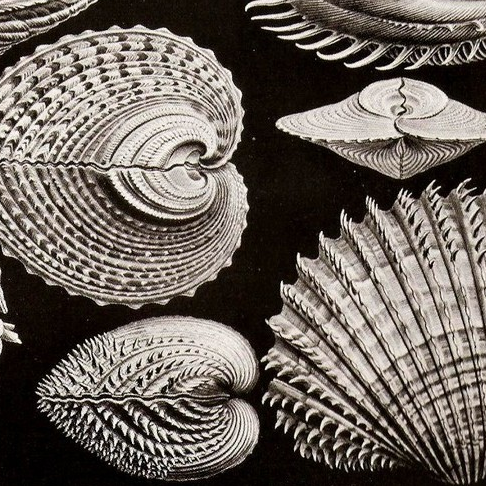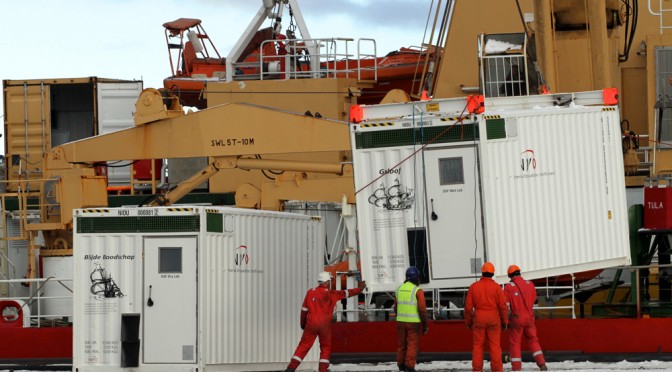By Robert-Jan Wille
Recently, the British Antarctic Survey’s Rothera station has welcomed new guests. A group of Dutch scientists from the universities of Utrecht and Groningen and from the Royal Netherlands Institute for Sea Research arrived this season to do laboratory research, financially supported by the NWO, the Dutch NSF. Neither being able nor willing to construct a research site for themselves on the seventh continent, these Dutch institutions decided to piggyback. Why not stay at the compounds of their North Sea neighbours, located on Adelaide Island?
And it is quite interesting to see the freebies the Dutch got. The British arrange the logistics (from Cambridge) and they have built the mobile docking station that matches with the four Dutch mobile laboratories. Interestingly, these mobile labs are rebuilt… cargo containers. So, this is how Dutch big science rolls!
Actually, I think I applaud this.
Why build a new one, just for the sake of national prestige? The Belgians have a major Antarctica tradition, so they have very self-consciously built a very futuristic site of their own (see picture below). Thunderbirds are go! However, because only a few would be able to see it, the Belgians decided to build it up a first time in a public hall in Brussels before sending it to the South Pole. I was there, in 2007, at Tour & Taxis square. It was a great wow!-moment: I was back in the nineteenth century, in the age of exploration and world fairs. And it was an age of nationalism. So, for a moment we were all Belgians: the Flemish, the Walloons, the Bruxellois and even the foreign Dutch such as me. It was nationalism in one of its more inclusive and friendly disguises.
It is not just the Belgians who have a continuous tradition of nationalism, big science and Antarctic exploration. Even the BAS itself is a project that is not fully without feelings of national pride, as the British government found out this November when it tried to merge the Survey with the National Oceanography Centre.
You think exploration and scientific warfare refer to the battle of environmental research and policy advocates with their critics? Ha! Bow to the older tradition of olympic nationalism. To paraphrase Clausewitz: science is the continuation of (economic) warfare with other means. (So, with Clausewitz’ original statement in mind, we can say: science = politics).
But what role does nationalism play in a country where people pride themselves to be cheap on stuff? Yes, I mean you, Holland, o, preacher, explorer, whaler and slave trader. Well, ‘we’ don’t feel ashamed of doing little science, as long as other nations’ big science pays our jobs. I don’t mind, actually. It is common sense.
The official reasoning behind the Dutch decision to make use of British infrastructure is that research stations have become an environmental problem themselves. I think this is right, in a sense: why have airstrips, fragmented villages spread out over the whole continent, with every nation their own station, with scientists publishing the same kind of research in different languages?
What I do not applaud is the cliché Golden Age nationalism that is put on top of the mission anyway. To honour the Golden Age of Greatness, the laboratories have been christened Geloof, Hoop, Liefde and Blijde Boodschap, or ‘Faith’, ‘Hope’, ‘Love’ and the ‘Good News (or in older English: Evangely)’. These were the names of four of five ships (the fifth was Trouw or ‘Loyalty’) that sailed from Rotterdam in the seventeenth century to find new trade routes and carried aboard the ‘discoverer’ of Antarctica, Dirck Gerritsz. Recently, Rob van Gent, sent a critical letter to the Dutch journals: the discovery of Antarctica by Gerritsz is close to fiction.
Why do we have to keep going back to that Golden Age, again and again? There is more continuity with nineteenth century Dutch biology than with the trade-dominated exploration by long-distance corporations four hundred years ago. The Royal Netherlands Institute for Sea Research itself was founded in 1874 as… a mobile laboratory at the sea coast! It was built for natural historical and embryological research.
More about this station next time. Because, when in the nineteenth century the cheap-ass laboratory was patented by the Dutch, the seventeenth century was invented too. As an age of heroic scientific exploration, an age of Dutch greatness. A dream.
Edit: David Baneke sent me an interesting link: more on the Dutch motives here. Important is that Dutch have a duty, as a party to the Antarctic Treaty.
o-o-o
Robert-Jan Wille is an expert in late nineteenth of laboratory biology in the field, both zoology and botany. He likes tree-like ferns, tarsiers, herring and onions, and loves watching nature, especially from behind the window.


